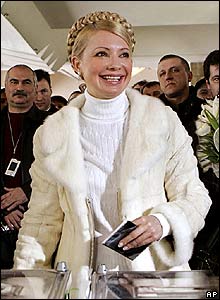
TYMOSHENKO REACHES OUT TO FOREIGN INVESTORS
Publication: Eurasia Daily Monitor Volume: 5 Issue: 24
By:

On February 5 Ukraine was admitted to the World Trade Organization. That achievement will facilitate Ukrainian Prime Minister Yulia Tymoshenko’s efforts to attract foreign investment. Kicking off that campaign on January 24 she held a two-hour meeting in Kyiv with 250 foreign investors. Then on January 28-29 Tymoshenko met with EU and NATO officials in Brussels.
While in Brussels Tymoshenko addressed the Foreign Affairs Committee of the European Parliament; both have strongly backed Ukraine’s EU membership aspirations since the Orange Revolution. In addition, Tymoshenko’s Fatherland Party became an associate member of the European Parliament’s center-right European People’s Party-European Democrats (EPP-ED) political group in January. President Viktor Yushchenko’s Our Ukraine, the other half of the orange parliamentary coalition, is already an associate member of the block.
In both Kyiv and Brussels Tymoshenko outlined her Tymoshenko Transparency Initiative (TTI) and other ways of improving the country’s struggle against corruption. She offered to cooperate with the EU on European energy security, principally through offering to cooperate on alternative energy supplies from Russia.
The Kyiv meeting featured presentations by government ministers followed by comments from the European Business Association (EBA), the European Bank for Reconstruction and Development, and Ernst and Young. The meeting grew out of the Tymoshenko Bloc’s September 10, 2007, “Contract with Investors,” which outlined the Bloc’s platform to encourage domestic and foreign direct investment.
The Contract with Investors outlined key areas for a future Tymoshenko government, which are being implemented using foreign and domestic advice. Policy reforms will improve the legal framework for foreign investors, implement fiscal and administrative policies that support foreign and domestic investment, create a comprehensive energy program, lead to additional transparent privatizations, and advance trade opportunities through the EU and WTO. Trade turnover between the EU and Ukraine totaled $39.3 billion in 2006.
Several outside studies were unveiled at the Kyiv meeting. Analysts from the Washington-based Rand Corporation’s International Security and Defense Policy Center presented a report, “Encouraging Trade and Foreign Direct Investment in Ukraine,” that was co-authored by the Kyiv-based Center for European and International Studies (CEIS). CEIS is headed by Hryhoriy Nemirya, deputy prime minister for European and international integration. Nemirya played a key role in Fatherland’s decision to join the EPP-ED instead of the Socialist International, and he also negotiated the last remaining obstacles that paved the way for Ukraine to join the WTO.
The EBA prepared a comprehensive “Barriers to Investment” survey that will be incorporated into the government programs and an “Action Plan” spreadsheet that provides a timetable.
Building on BYuT’s use of foreign advice, the government is set to create a Council of Foreign and Domestic Advisors that will work on improving Ukraine’s investment climate. The Council, part of the TTI, will consist of businessmen, policymakers, and experts. Ukraine had a similar council under former President Leonid Kuchma, but it rarely convened and had little influence.
While Ukraine attracted little foreign investment under Kuchma, Tymoshenko made considerable strides while prime minister in 2005. That government organized Ukraine’s first transparent privatization, selling Kryvorizhstal to Dutch registered Mittal Steel for $4.8 billion. Kryvorizhstal had to be re-privatized because of the fraudulent nature of its undervalued sale for $800 million to Ukrainian oligarchs in July 2004.
The energy portion of the TTI was outlined in Tymoshenko’s May/June 2007 Foreign Affairs article “Containing Russia.” The article was the first in the journal’s 86-year history that received a rebuke from a Foreign Ministry (Russia’s) prior to its publication.
BYuT has been the only consistent political force in the Ukrainian parliament that has opposed the use of the non-transparent and corrupt intermediary, RosUkrEnergo, which transports Central Asian gas to Ukraine. In January 2006 BYuT and the Party of Regions voted no confidence in the government of Yuriy Yekhanurov over a gas deal signed earlier that month that included RosUkrEnergo.
The Tymoshenko government has advised Russia and the EU that it will seek to remove RosUkrEnergo in favor of a bilateral gas relationship with Russia. Gazprom chief (and Putin’s official successor) Dmitry Medvedev is not opposed to this step.
The Tymoshenko’s government’s initiatives have been cautiously welcomed by Anders Aslund, a senior fellow at the Peterson Institute for International Economics and perhaps the fiercest Western critic of the 2005 Tymoshenko government. Aslund commended the current Tymoshenko government for moving “quickly on three fronts” against corruption: halting the Yanukovych government’s fraudulent VAT refunds, moving to clean up customs operations, and seeking to remove RosUkrEnergo.
With these initiatives, the Tymoshenko government becomes Ukraine’s first government committed to undertaking the domestic reforms that would increase the country’s Euro-Atlantic membership prospects.
(Ibyut.com, kmu.gov.ua, byut.com.ua, Pravda.com.ua, rand.org, europarl.europa.eu, themoscowtimes.com)




